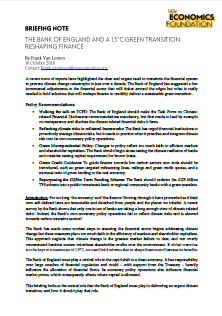City scrambles to act on climate change as window to limit risks is 'finite and closing'
Well, they're not saying:
Banks will not be forced to reveal climate change risks they face | Environment | The Guardian
The New Economics Foundation asks a few questions:
RESHAPING FINANCE FOR A 1.5C WORLD
WHAT THE BANK OF ENGLAND NEEDS TO DO FOR A GREEN TRANSITION
Climate change is here, and it’s not just the price of beer that is going to be affected. According to the latest IPCC report, we have just over a decade to limit climate change catastrophe. The transition to a just, sustainable economy will affect all aspects of society – including the financial sector. The implications of this report are clear: we urgently need bold solutions that reshape finance and harness its benefits to catalyse a sustainable low carbon transition.
First, the good news: in certain parts of the financial world at least, the tide may be turning. In fact, last Friday 19 of the world’s leading central banks and regulators warned that the financial risks of climate change were “system-wide and potentially irreversible if not addressed”.
This potentially game-changing report states that it is within the mandate of central banks to ensure the financial system is resilient to climate change and, as we recommended over the summer, the report calls on central banks to lead by example in the fight against climate change. It is difficult to overestimate how significant this step – no, leap – really is!
The question now is: will the Bank of England follow suit? In the absence of reform, finance risks‘locking-in’ and exacerbating the worst effects of climate change.
A recent survey by the Bank shows that only one in 10 banks are taking a long enough view of climate-related risks. We have an overly concentrated financial system that lacks diversity and prioritises short-term profits and shareholder interests over the environment. For too long the financial industry has regarded ‘the economy’ and ‘finance’ as detached from people and the planet we live on, following some immutable laws we have no control over.
CLIMATE CHANGE IS THE GREATEST MARKET FAILURE WE’VE EVER SEEN, IT’S ESSENTIAL THAT THE BANK OF ENGLAND TAKE RESPONSIBILITY FOR ADDRESSING IT.
As we mentioned in the Guardian and Telegraph on Monday, the Bank has made some modest steps in ensuring the financial sector begins addressing climate change but the findings of the recent IPCC report imply that we need to do much more than simply tinker around the edges.
The approach taken by the Bank places too much faith in the efficiency of markets and shareholder capitalism. Excessive faith in market efficiency is what led to the last financial crisis. Climate change is the greatest market failure we’ve ever seen, it’s essential that the Bank of England take responsibility for addressing it.
The real irony is that while the Bank is pushing banks and insurers to be more transparent and prepare for climate change, the Bank’s own monetary policy framework fails to reflect climate risks and is skewed towards carbon intensive sectors. The Bank is now in serious danger of not practicing what it preaches.
Incremental adjustments to finance are not enough to tackle the monumental challenge of a rapid, sustainable and fair transition to a clean economy. We will need innovative and disruptive reforms that help reshape finance, so that it can help sustain our planet and enable us to thrive.
In light of this, the New Economics Foundation has released a new briefing with the following recommendations:
- Walking the talk on TCFD: The Bank of England should make the Task Force on Climate related Financial Disclosures recommendations mandatory, but first needs to lead by example on transparency and disclose the climate related financial risks it faces.
- Reflecting climate risks in collateral frameworks: The Bank has urged financial institutions to proactively manage climate risks, but it needs to practice what it preaches and integrate climate risk into its own monetary policy operations.
- Green macroprudential policy: Changes to policy reflect too much faith in efficient markets and shareholder capitalism. The Bank should begin stress testing the climate resilience of banks and consider raising capital requirement for brown loans.
- Green credit guidance: To guide finance towards low-carbon sectors new tools should be introduced, such as: green targeted refinancing lines, ceilings and green credit quotas, and a minimal ratio of green lending to the real economy.
- Repurposing the £125bn Term Funding Scheme: The Bank should redirect the £125 billion TFS scheme into a public investment bank or regional community banks with a green mandate.
Read the full paper below.
Reshaping finance for a 1.5C world | New Economics Foundation
.
.
.


No comments:
Post a Comment